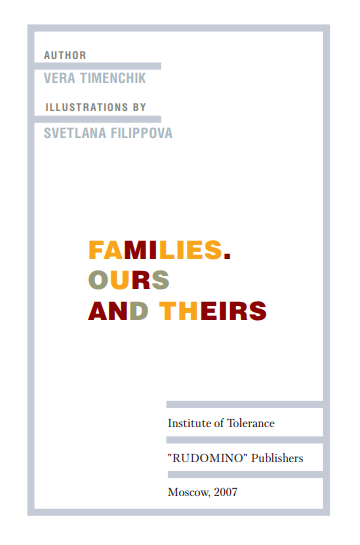Others. Other. Otherwise: Ludmila Ulitskaia’s Children’s Book Series (1)
Ludmila Ulitskaia began publishing her book series for children–Other, Others, Otherwise–in 2006 to promote understanding of and tolerance towards other people and cultures. A collaborative project, Other, Others, Otherwise [Другой, другие, о других] is sponsored by the Institute of Tolerance, founded in 2003, and two major Russian publishing houses, Eksmo and Rudomino. Twenty books, each written by an author invited by Ulitskaia herself, will complete the series, which is intended for readers between 11 and 15 years of age.
To date, Eksmo has published twelve books:
Вера Тименчик. Семья у нас и у других (2006);
Анастасия Гостева. Большой взрыв черепахи (2006);
Раиса Кирсанова. Путешествие по чужим столам (2006);
Раиса Кирсанова. Ленты, кружева, ботинки (2006);
Арина Бутовская. О дохлой кошке и живых котятах (2008);
Лариса Винник. Я не виноват (2008);
Андрей Усачев. Всеобщая декларация цчеловека в пересказе для детей и взрослых (2008);
Анастасия Гостева. Дух дома дома? (2008);
Наталья Борисова. Про про профессии (2008);
Константин Скрипкин. ВИЧ и СПИД. Что с этим делать? (2009);
Антон Березин. История с деньгами, или детям до 16 путешествовать по времени разрешается (2010);
Ирина Ясина. Человек с человеческими возможностями (2010).
Ulitskaia’s series takes young readers away from the world of high fantasy that dominates contemporary Russian children’s literature back to history and real life. Central to her agenda are such social issues as diversity, tolerance, and understanding of the “other.” Ulitskaia argues that since Russian people live in a multi-national state, it is time for them to acknowledge that “different nationalities have cultural traditions strikingly different from what we consider ‘normal’ or ‘correct.’” [i] Otherwise, says Ulitskaia, the state of Russian society will remain “horrific” because the majority of people refuse to take responsibility for the “brutal minors with wooden brains” who murder “black students, Chinese vendors, and Tadzhik girls” in the public places of big Russian cities. [ii] The responsibility for these murders, Ulitskaia argues, is collective, and she hopes her books will help overcome “misunderstanding, irritation, hostility, and even hatred” of the “other,” of the people who are not enemies, but not “like us” either (Pisatel’, 12). Moreover, says Ulitskaia, it is time to realize that Russian authorities manipulate the concept of “the other” (the oligarchs, people from the Caucasus, or migrants) to create scapegoats for the country’s mounting economic and social problems.
Undoubtedly, Ulitskaia’s series makes children think about the contradictions, ambiguities, and complexities of human life. Some books in the series may seem challenging and even shocking but they all provide a lesson in diversity and frequently bring up issues that traditionally have been reserved for adults.
Reviewed by Larissa Rudova
[i] Anton Zhelnov. Interview with Ludmila Ulitskaia: “Drugie—ne chuzhie,” Vedomosti 150 (August 15, 2006): n.p..
[ii] “Pisatel’ Liudmila Ulitskaia: ‘Nashi knigi o cheloveke, kotoryi ne takov, kak vy.’” Izvestiia 106 (June 19, 2006): 12.
 Vera Timenchik’s book, Семья у нас и у других (2006) conveys liberal sensibilities and openly discusses questions that until recently were never raised in Russian schools: xenophobia, school bullying, war in the Caucasus, ethnic intolerance, divorce, homosexual marriage, and marital age. Timenchik centers the book’s plot on two 12-year old friends: Kirill is a native Russian born in Moscow; Daut is a recent immigrant from Abkhazia, an area in the Caucasus. Kirill’s family is small and liberal; Daut’s family is, on the contrary, large and patriarchal. Yet, despite their differences, the Kirill and Daut become friends and learn to accept each other’s differences.
Vera Timenchik’s book, Семья у нас и у других (2006) conveys liberal sensibilities and openly discusses questions that until recently were never raised in Russian schools: xenophobia, school bullying, war in the Caucasus, ethnic intolerance, divorce, homosexual marriage, and marital age. Timenchik centers the book’s plot on two 12-year old friends: Kirill is a native Russian born in Moscow; Daut is a recent immigrant from Abkhazia, an area in the Caucasus. Kirill’s family is small and liberal; Daut’s family is, on the contrary, large and patriarchal. Yet, despite their differences, the Kirill and Daut become friends and learn to accept each other’s differences.